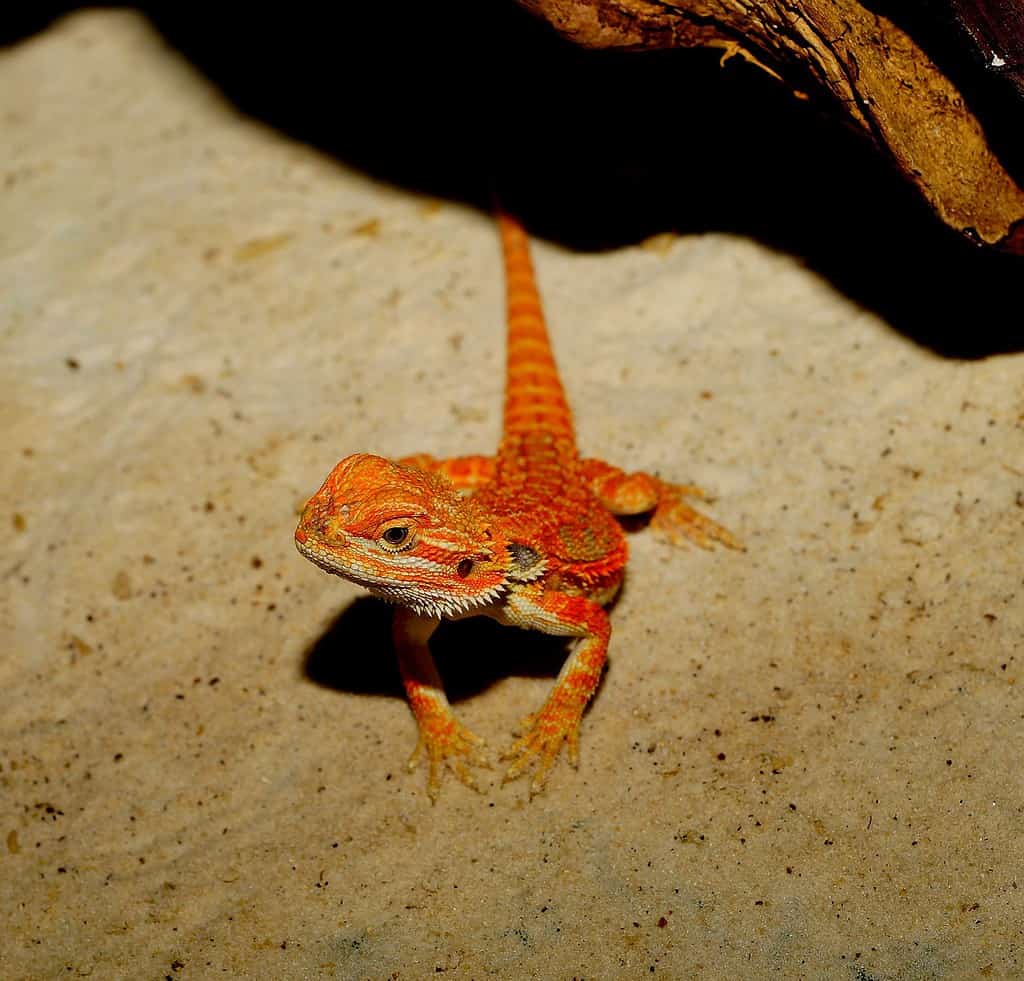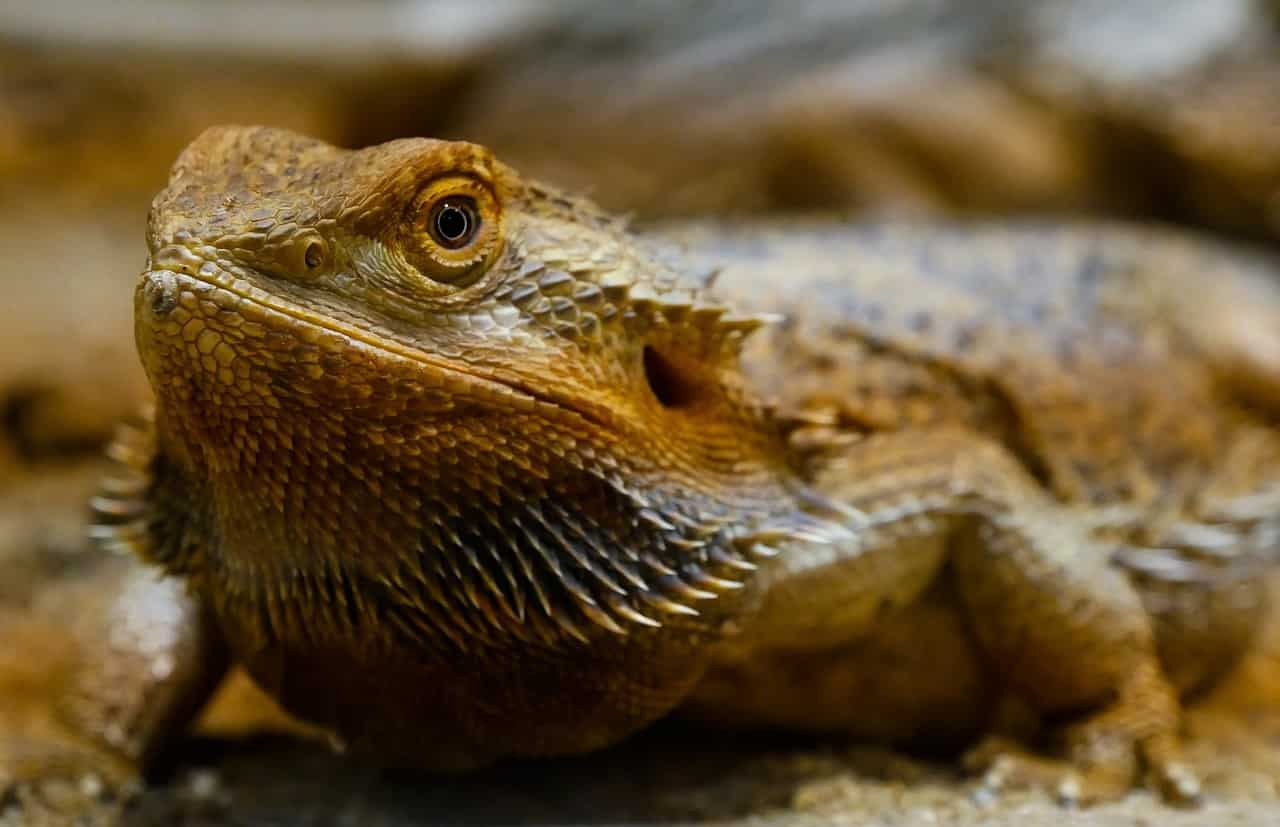Bearded dragons are very popular as pets all over the world. People like these lizards because they are calm and exotic-looking. Most people think they are friendly and rarely aggressive. Therefore, it could be a shock to find out that bearded dragons can bite. Biting is rare and doesn’t hurt people but it can signify a bigger problem.

Do bearded dragons bite dangerous? Bearded dragons may indeed bite, although it doesn’t happen very often. Whenever they do bite, it is usually for a good reason. When a bearded dragon bites you, it feels like a small sting. It doesn’t hurt as much as when a cat or dog bites you.
Continue reading to find out if a bearded dragon’s bite is painful, what causes them to bite, and other relevant information.
Can Bearded Dragons Bite?
Lizards belonging to the Pogona genus and the Agamidae family are known as bearded dragons. Lizards don’t usually bite unless they feel threatened, annoyed, or trapped. Bearded dragons, like the vast majority of other reptiles, can bite.
They have a few teeth, but you need to look closely to see them because they are quite small. Since the teeth are not sharp, a dragon bite is less dangerous and can cause injuries or pain.
Bearded dragons have teeth-regrowing cells. This complication arises when the front teeth are pushed inward. The rear teeth are well-protected, so they don’t fall out and don’t regrow. Young dragon bites are less harmful. In fact, no one notices them because the jaws of newborns are so weak. As a direct consequence, it cannot provide a powerful bite.
There are various reasons a beardie may bite, each with behavioural symptoms and techniques to prevent it. Bearded dragons seldom cause major injuries to their owners because of their sharp teeth. How hard a bearded dragon bite depends on how big its teeth are, how old it is, and what gender it is.
What Caused My Bearded Dragon to Bite Me?
You might wonder why your bearded dragon, usually calm, bit you even if you did nothing different from what you always do. There are various reasons why a bearded dragon could bite a person, some of them include the following:
Food
It is among the most prevalent reasons why a bearded dragon may bite someone. Be wary if the fragrance of food emerges from your hands and your beardy appears to be hungry.
If you do not wash your hands after handling food and then reach into the bearded dragon’s habitat, the bearded dragon can give you a fast bite out of instinct because of the unique senses it possesses. Their sense of smell originates in their sense of taste. Therefore, if they detect the scent of food on your finger, they may attempt to take a bite out of what they believe to be food on your finger.
Others have been bitten by hungry bearded dragons while feeding them because they didn’t move their hand out of the way. It is in your best interest to move rapidly throughout the procedure.
Stress
Stress or discomfort are frequently present as warning signs when a bearded dragon isn’t feeling well. It is considerably more likely that a bearded dragon may bite when feeling nervous or uncomfortable.
Stress bites can range from minor nips to full-fledged bites depending on their trust and pain. However, because stressed reptiles are frequently more reactive than usual, these injuries are more likely to be serious.
If your bearded dragon appears unusually agitated, it may be ready to bite if they feel threatened. During this period, avoid touching them and monitor their tank.
Signs of stress include abnormally frantic or lethargic behaviour, lack of appetite, a mouth that hangs wide, and hissing. They could indicate something is wrong, so keep an eye out for other possible signs like tiredness, a change in colour, the release of mucus, or a weight change.
Mishandling
People without reptile experience may often mishandle them, resulting in bites. If you handle the bearded dragon improperly while picking it up, you risk harming both the dragon and yourself.
Children are so eager to hold a dragon that they often handle it forcefully or improperly, prompting the dragon to bite as a sign of dissatisfaction.
Lack of Socializing
It’s possible that your bearded dragon isn’t used to being handled, which may bite. Bearded dragon hatchlings are usually socialized at a young age by reputable breeders, although this is not always the case. Sometimes it doesn’t happen until they are older. When you’ve just met this person, it’s possible that it doesn’t matter that you’ve just met them.
When you first receive a bearded dragon, it is essential to take things slowly, provide them with some space, and refrain from handling them. This is especially important to remember while dealing with younger dragons or rescued dragons since these dragons are typically more timid and inclined to bite.
To get them to trust you, you must build a strong relationship with them. You must spend time with them and gradually handle them more until they are comfortable.
Is a Beardy’s Bite Dangerous?
In most cases, the bites of bearded dragons do not provide a severe health risk. The most dangerous thing about bearded dragons is that they carry lots of bacteria, which can cause infections.
Following a bite by a bearded dragon, the following are some probable outcomes:
- Bleeding badly
- Swelling
- Salmonella infection
The possibility of salmonella contamination is the most significant issue; the lips of bearded dragons are known to contain salmonella germs. If a human is bitten, these bacteria will be transferred to them. Being infected with this can result in severe issues with one’s gastrointestinal tract.

What Does It Feel Like When a Bearded Dragon Bites?
Bearded dragons have teeth that are very sharp and serrated, like the blades of knives. Depending on the bearded dragon’s age and size, the sensation of the bites can range widely from mild to severe. Some believe that juveniles’ sensation is little more than mild stinging. Some people say it will hurt and might even draw blood.
Other things that might affect the bite include if they are attempting to injure you from feeling threatened or trying to get food. Even if they attack you, they will only draw a little bit of blood.
Though it may not hurt, the illness might get to you, and any sign of your beardy biting you on purpose is bad news. See a vet if you think your bearded dragon is hostile or regards you as an enemy.
How to Treat a Bite From a Bearded Dragon?
If a bearded dragon bites you, you should know how to treat it. First, you should use an antiseptic cloth to clean the area. Even if the creature that bit you did not break the skin, you should carry out this procedure.
If you make it a practice to touch your dragon, washing your hands afterwards is a smart precaution to take at all times. The following step will be taken according to whether or not the bite has caused the skin to break.
If the skin is injured, apply a plaster and use an antiseptic wipe routinely to remove bacteria, especially after handling the animal. You do not need to do anything beyond this straightforward method that relies on common sense. If the bite gets infected, which is unlikely, you should have it checked out by a doctor.
